- Home
- Dan Simmons
Hyperion h-1 Page 5
Hyperion h-1 Read online
Page 5
“What thing?” I asked.
“His life,” said the doctor and pulled the skin of the corpse’s face up and back like a greasy mask. “Your life. My life.” The red and white stripes of overlapping muscle turned to blue bruise around the ragged hole just above the cheekbone.
“There has to be more than this,” I said.
The doctor looked up from his grim work with a bemused smile. “Is there?” he said. “Please show me.” He lifted the man’s heart and seemed to weigh it in one hand. “In the Web worlds, this’d be worth some money on the open market. There’re those too poor to keep vat-grown, cloned parts in store, but too well off to die just for want of a heart. But out here it’s just offal.”
“There has to be more,” I said, although I felt little conviction. I remembered the funeral of His Holiness Pope Urban XV shortly before I left Pacem. As has been the custom since pre-Hegira days, the corpse was not embalmed. It waited in the anteroom off the main basilica to be fitted for the plain wooden coffin. As I helped Edouard and Monsignor Frey place the vestments on the stiffened corpse I noticed the browning skin and slackening mouth.
The doctor shrugged and finished the perfunctory autopsy. There was the briefest of formal inquiries. No suspect was found, no motive put forward. A description of the murdered man was sent to Keats but the man himself was buried the next day in a pauper’s field between the mud flats and the yellow jungle.
Port Romance is a jumble of yellow, weirwood structures set on a maze of scaffolds and planks stretching far out onto the tidal mud flats at the mouth of the Kans.
The river is almost two kilometers wide here where it spills out into Toschahai Bay, but only a few channels are navigable and the dredging goes on day and night. I lie awake each night in my cheap room with the window open to the pounding of the dredge-hammer sounding like the booming of this vile city’s heart, the distant susurration of the surf its wet breathing.
Tonight I listen to the city breathe and cannot help but give it the flayed face of the murdered man.
The companies keep a skimmerport on the edge of town to ferry men and matriel inland to the larger plantations, but I do not have enough money to bribe my way aboard. Rather, I could get myself aboard but cannot afford to transport my three trunks of medical and scientific gear. I am still tempted. My service among the Bikura seems more absurd and irrational now than ever before. Only my strange need for a destination and a certain masochistic determination to complete the terms of my self-imposed exile keep me moving upriver.
There is a riverboat departing up the Kans in two days. I have booked passage and will move my trunks onto it tomorrow. It will not be hard to leave Port Romance behind.
Day 41
The Emporotic Girandole continues its slow progress upriver. No sight of human habitation since we left Melton’s Landing two days ago. The jungle presses down to the riverbank like a solid wall now; more, it almost completely overhangs us in places where the river narrows to thirty or forty meters. The light itself is yellow, rich as liquid butter, filtered as it is through foliage and fronds eighty meters above the brown surface of the Kans. I sit on the rusted tin roof of the center passenger barge and strain to make out my first glimpse of a tesla tree. Old Kady sitting nearby pauses in his whittling, spits over the side through a gap in his teeth, and laughs at me. “Ain’t going to be no flame trees this far down,” he says. “If they was the forest sure all hell wouldn’t look like this. You got to get up in the Pinions before you see a tesla. We ain’t out of the rain forest yet, Padre.”
It rains every afternoon. Actually, rain is too gentle a term for the deluge that strikes us each day, obscuring the shore, pounding the tin roofs of the barges with a deafening roar, and slowing our upstream crawl until it seems we are standing still. It is as if the river becomes a vertical torrent each afternoon, a waterfall which the ship must climb if we are to go on.
The Oirandole is an ancient, flat-bottomed tow with five barges lashed around it like ragged children clinging to their tired motheris skins.
Three of the two-level barges carry bales of goods to be traded or sold at the few plantations and settlements along the river. The other two offer a simulacrum of lodging for the indigenies traveling upriver, although I suspect that some of the barge’s residents are permanent. My own berth boasts a stained mattress on the floor and lizard-like insects on the walls.
After the rains everyone gathers on the decks to watch the evening mists rise from the cooling river. The air is very hot and supersaturated with moisture most of the day now. Old Kady tells me that I have come too late to make the climb through the rain and flame forests before the tesla trees become active. We shall see.
Tonight the mists rise like the spirits of all the dead who sleep beneath the river’s dark surface. The last tattered remnants of the afternoon’s cloud cover dissipate through the treetops and color returns to the world. I watch as the dense forest shifts from chrome yellow to a translucent saffron and then slowly fades through ocher to umber to gloom. Aboard the Girandole, Old Kady lights the lanterns and candle-globes hanging from the sagging second tier and, as if not to be outdone, the darkened jungle begins to glow with the faint phosphorescence of decay while glowbirds and multihued gossamers can be seen floating from branch to branch in the darker upper regions.
Hyperion’s small moon is not visible tonight but this world moves through more debris than is common for a planet so close to its sun and the night skies are illuminated by frequent meteor showers. Tonight the heavens are especially fertile and when we move onto wide sections of the river we can see a tracery of brilliant meteor trails weaving the stars together. Their images burn the retina after a while and I look down at the river only to see the same optic echo there in the dark waters.
There is a bright glow on the eastern horizon and Old Kady tells me that this is from the orbital mirrors which give light to a few of the larger plantations.
It is too warm to return to my cabin. I spread my thin mat on the rooftop of my barge and watch the celestial light show while clusters of indigenie families sing haunting songs in an argot I have not even tried to learn. I wonder about the Bikura, still far away from here, and a strange anxiety rises in me.
Somewhere in the forest an animal screams with the voice of a frightened woman.
Day 60
Arrived Perecebo Plantation. Sick.
Day 62
Very ill. Fever, fits of shaking. All yesterday I was vomiting black bile. The rain is deafening. At night the clouds are lit from above by orbital mirrors. The sky seems to be on fire. My fever is very high.
A woman takes care of me. Bathes me. Too sick to be ashamed. Her hair is darker than most indigenies’. She says little. Dark, gentle eyes.
Oh, God, to be sick so far from home.
Day sheis waiting spying comesin from the rain the thin shirt on purpose to tempt me, knows what iam my skin burning on fire thin cotton nipples dark against it i knowwho they are they are watching, here hear their voices at night they bathe me in poison burns me they think I dont know but i hear their voices above the rain when the screaming stops stop stop My skin is almost gone. red underneath can feel the hole in my cheek. when I find the bullet iwill spit it out it out. agnusdeiquitolispecattamundi miserer nobis misere nobis miserere
Day 65:
Thank you, dear Lord, for deliverance from illness.
Day 66
Shaved today. Was able to make it to the shower.
Semfa helped me prepare for the administrator’s visit. I expected him to be one of the large, gruff types I’ve seen out the window working in the sorting compound, but he was a quiet black man with a slight lisp.
He was most helpful. I had been concerned about paying for my medical care but he reassured me that there would be no charge. Even better—he will assign a man to lead me into the high country! He says it is late in the season but if I can travel in ten days we should be able to make it through the flame forest to the Cleft
before the tesla trees are fully active.
After he left I sat and talked to Semfa a bit. Her husband died here three local months ago in a harvesting accident. Semfa herself had come from Port Romance; her marriage to Mikel had been a salvation for her and she has chosen to stay on here doing odd jobs rather than go back downriver. I do not blame her.
After a massage, I will sleep. Many dreams about my mother recently.
Ten days. I will be ready in ten days.
Day 75
Before leaving with Tuk, I went down to the matrix paddies to say goodbye to Semfa. She said little but I could see in her eyes that she was sad to see me go.
Without premeditation, I blessed her and then kissed her on the forehead. Tuk stood nearby, smiling and bobbing. Then we were off, leading the two packbrids.
Supervisor Orlandi came to the end of the road and waved as we entered the narrow lane hacked into the aureate foliage.
Domine, dirige nos.
Day 82
After a week on the trail—what trail?—after a week in the trackless, yellow rain forest, after a week of exhausting climb up the ever steeper shoulder of the Pinion Plateau, we emerged this morning onto a rocky outcropping that allowed us a view back across an expanse of jungle toward the Beak and the Middle Sea.
The plateau here is almost three thousand meters above sea level and the view was impressive. Heavy rain clouds spread out below us to the foot of the Pinion Hills, but through gaps in the white and gray carpet of cloud we caught glimpses of the Kans in its leisurely uncoiling toward Port R. and the sea, chrome-yellow swatches of the forest we had struggled through, and a hint of magenta far to the east that Tuk swore was the lower matrix of fiberplastic fields near Perecebo.
We continued onward and upward late into the evening.
Tuk is obviously worried that we will be caught in the flame forests when the tesla trees become active. I struggle to keep up, tugging at the heavily laden ’brid and saying silent prayers to keep my mind off my aches, pains, and general misgivings.
Day 83
Loaded and moving before dawn today. The air smells of smoke and ashes.
The change in vegetation here on the Plateau is startling.
No longer evident are the ubiquitous weirwood and leafy chalma. After passing through an intermediate zone of short evergreens and everblues, then after climbing again through dense strands of mutated lodgepole pines and triaspen, we came into the flame forest proper with its groves of tall prometheus, trailers of ever present phoenix, and round stands of amber lambents. Occasionally we encountered impenetrable breaks of the white-fibrous, bifurcated bestos plants that Tuk picturesquely referred to as “…looking like de rotting cocks o’ some dead giants what be buried shallow here, dat be sure.” My guide has a way with words.
It was late afternoon before we saw our first tesla tree. For half an hour we had been trudging over an ash-covered forest floor, trying not to tread on the tender shoots of phoenix and firewhip gamely pushing up through the sooty soil, when suddenly Tuk stopped and pointed.
The tesla tree, still half a kilometer away, stood at least a hundred meters tall, half again as high as the tallest prometheus. Near its crown it bulged with the distinctive onion-shaped dome of its accumulator gall.
The radial branches above the gall trailed dozens of nimbus vines, each looking silver and metallic against the clear green and lapis sky. The whole thing made me think of some elegant High Muslim mosque on New Mecca irreverently garlanded with tinsel.
“We got to get de ’brids and our asses de hell out o’ here,” grunted Tuk. He insisted that we change into flame forest gear right then and there. We spent the rest of the afternoon and evening trudging on in our osmosis masks and thick, rubber-soled boots, sweating under layers of leathery gamma-cloth. Both of the ’brids acted nervous, their long ears pricking at the slightest sound. Even through my mask I could smell the ozone; it reminded me of electric trains I had played with as a child on lazy Christmas Day afternoons in Villefranche-sur-Saône.
We are camping as close as we can to a bestos break this night. Tuk showed me how to set out the ring of arrestor rods, all the time clucking dire warnings to himself and searching the evening sky for clouds.
I plan to sleep well in spite of everything.
Day 84
0400 hours—Sweet Mother of Christ.
For three hours we have been caught up in the middle of the end of the world.
The explosions started shortly after midnight, mere lightning crashes at first, and against our better judgment Tuk and I slid our heads through the tent flap to watch the pyrotechnics. I am used to the Matthew-month monsoon storms on Pacem, so the first hour of lightning displays did not seem too unusual. Only the sight of distant tesla trees as the unerring focus of the aerial discharge was a bit unnerving. But soon the forest behemoths were glowing and spitting with their own accumulated energy and then—just as I was drifting off to sleep despite the continued noise—true Armageddon was unleashed.
At least a hundred arcs of electricity must have been released in the first ten seconds of the tesla trees’ opening spasms of violent energy.
A prometheus less than thirty meters from us exploded, dropping flaming brands fifty meters to the forest floor. The arrestor rods glowed, hissed, and deflected arc after arc of blue-white death over and around our small campsite. Tuk screamed something but no mere human sound was audible over the onslaught of light and noise. A patch of trailing phoenix burst into flame near the tethered ’brids and one of the terrified animals—hobbled and blindfolded as it was—broke free and lunged through the circle of glowing arrestor rods. Instantly half a dozen bolts of lightning from the nearest tesla arced to the hapless animal. For a mad second I could have sworn I saw the beast’s skeleton glowing through boiling flesh and then it spasmed high into the air and simply ceased to be.
For three hours we have watched the end of the world.
Two of the arrestor rods have fallen but the other eight continue to function. Tuk and I huddle in the hot cave of our tent, osmosis masks filtering enough cool oxygen out of the superheated, smoky air to allow us to breathe. Only the lack of undergrowth and Tuk’s skill in placing our tent away from other targets and near the sheltering bestos plants have allowed us to survive. That and the eight whiskered-alloy rods that stand between us and eternity.
“They seem to be holding up well!” I shout to Tuk over the hiss and crackle, crash and split of the storm.
“Dey be made to stand de hour, mebbe two,” grunts my guide. “Any time, mebbe sooner, dey fuse, we die.”
I nod and sip at lukewarm water through the slipstrip of my osmosis mask. If I survive this night, I shall always thank God for His generosity in allowing me to see this sight.
Day 87
Tuk and I emerged from the smoldering northeastern edge of the flame forest at noon yesterday, promptly set up camp by the edge of a small stream, and slept for eighteen hours straight; making up for three nights of no sleep and two grueling days moving without rest through a nightmare of flame and ash. Everywhere we looked as we approached the hogback ridge that marked the terminus of the forest, we could see seedpods and cones burst open with new life for the various fire species that had died in the conflagration of the previous two nights. Five of our arrestor rods still functioned, although neither Tuk nor I was eager to test them another night. Our surviving packbrid collapsed and died the instant the heavy load was lifted off its back.
I awoke this morning at dawn to the sound of running water. I followed the small stream a kilometer to the northeast, following a deepening in its sound, until suddenly it dropped from sight.
The Cleft! I had almost forgotten our destination.
This morning, stumbling through the fog, leaping from one wet rock to another alongside the widening stream, I took a leap to a final boulder, teetered there, regained my balance, and looked straight down above a waterfall that dropped almost three thousand meters to mist, rock, and river
far below.
The Cleft was not carved out of the rising plateau as was the legendary Grand Canyon on Old Earth or World Crack on Hebron. In spite of its active oceans and seemingly earthlike continents, Hyperion is tectonically quite dead; more like Mars, Lusus, or Armaghast in its total lack of continental drift. And like Mars and Lusus, Hyperion is afflicted with its Deep Ice Ages, although here the periodicity is spread to thirty-seven million years by the long ellipse of the currently absent binary dwarf. The comlog compares the Cleft to the pre-terraformed Mariner Valley on Mars, both being caused by the weakening of crust through periodic freeze and thaw over the aeons, followed by the flow of subterranean rivers such as the Kans. Then the massive collapse, running like a long scar through the mountainous wing of the continent Aquila.
Tuk joined me as I stood on the edge of the Cleft. I was naked, rinsing the ash smell from my traveling clothes and cassock. I splashed cold water over my pale flesh and laughed out loud as the echoes of Tuk’s shouts came back from the North Wall two thirds of a kilometer away.
Because of the nature of the crust collapse, Tuk and I stood far out on an overhang that hid the South Wall below us. Although perilously exposed, we assumed that the rocky cornice which had defied gravity for millions of years would last a few more hours as we bathed, relaxed, shouted echoing hallos until we were hoarse, and generally acted like children liberated from school. Tuk confessed that he had never penetrated the full width of the flame forest—nor known anyone who had in this season—and announced that, now that the tesla trees were becoming fully active, he would have at least a three-month wait until he could return.

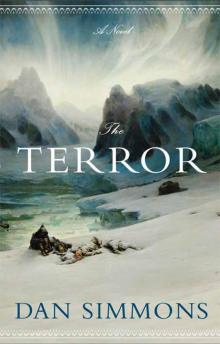 The Terror
The Terror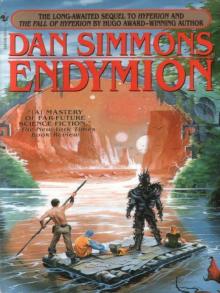 Endymion
Endymion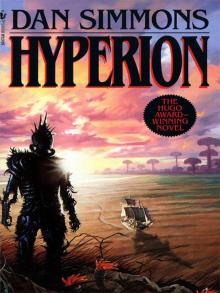 Hyperion
Hyperion The Crook Factory
The Crook Factory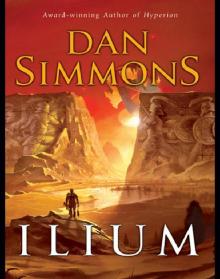 Ilium
Ilium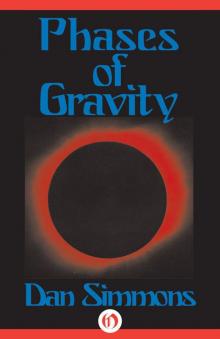 Phases of Gravity
Phases of Gravity Hardcase
Hardcase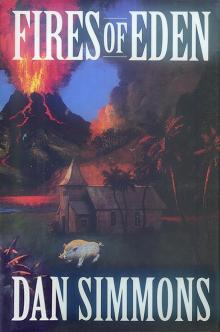 Fires of Eden
Fires of Eden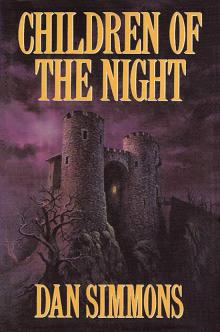 Children of the Night
Children of the Night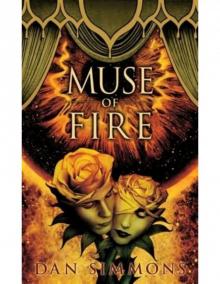 Muse of Fire
Muse of Fire Drood
Drood The Fifth Heart
The Fifth Heart Carrion Comfort
Carrion Comfort The Hollow Man
The Hollow Man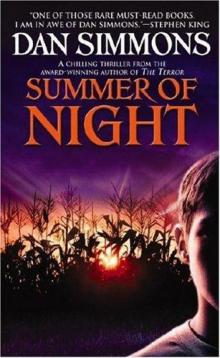 Summer of Night
Summer of Night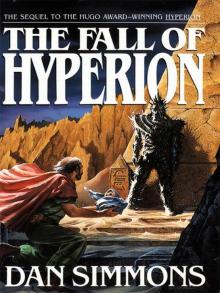 The Fall of Hyperion
The Fall of Hyperion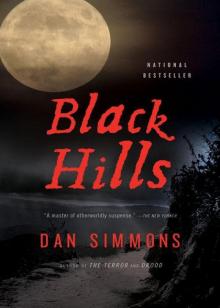 Black Hills
Black Hills A Winter Haunting
A Winter Haunting Hard Freeze
Hard Freeze Prayers to Broken Stones
Prayers to Broken Stones Hard as Nails
Hard as Nails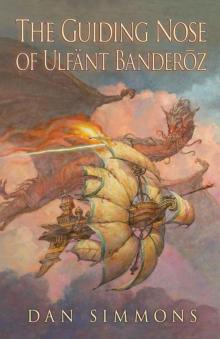 The Guiding Nose of Ulfant Banderoz
The Guiding Nose of Ulfant Banderoz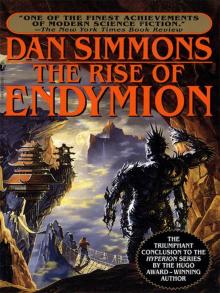 The Rise of Endymion
The Rise of Endymion Orphans of the Helix
Orphans of the Helix Lovedeath
Lovedeath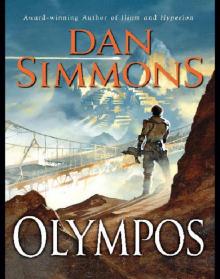 Olympos
Olympos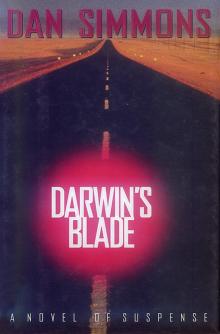 Darwin's Blade
Darwin's Blade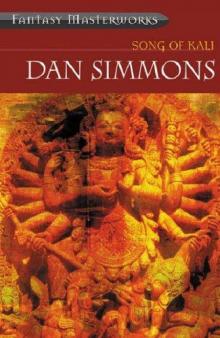 Song of Kali
Song of Kali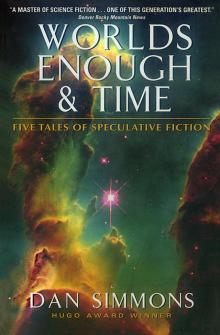 Worlds Enough & Time: Five Tales of Speculative Fiction
Worlds Enough & Time: Five Tales of Speculative Fiction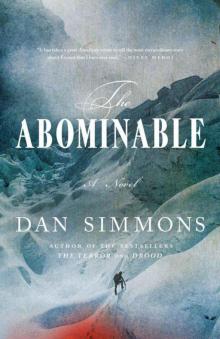 The Abominable
The Abominable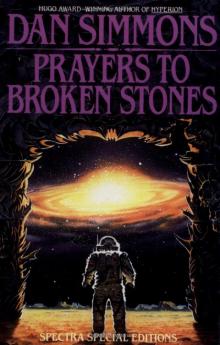 The Death of the Centaur
The Death of the Centaur Hard as Nails jk-3
Hard as Nails jk-3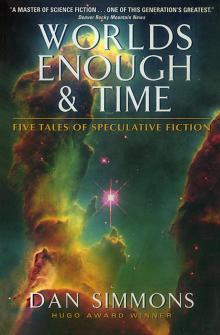 Worlds Enough & Time
Worlds Enough & Time Joe Kurtz Omnibus
Joe Kurtz Omnibus The Hyperion Cantos 4-Book Bundle
The Hyperion Cantos 4-Book Bundle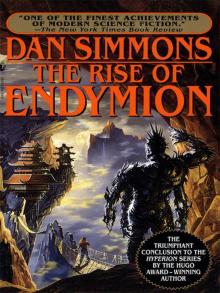 Rise of Endymion
Rise of Endymion Hard Freeze jk-2
Hard Freeze jk-2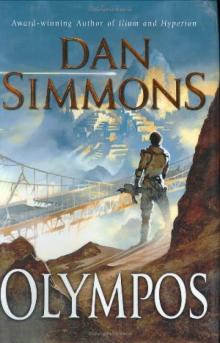 Olympos t-2
Olympos t-2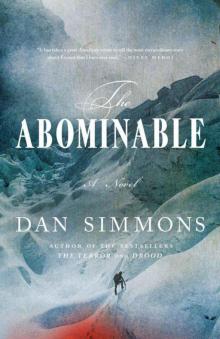 The Abominable: A Novel
The Abominable: A Novel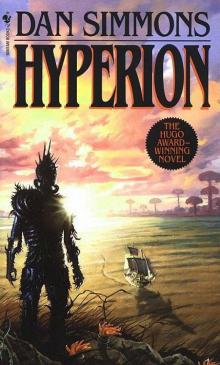 Hyperion h-1
Hyperion h-1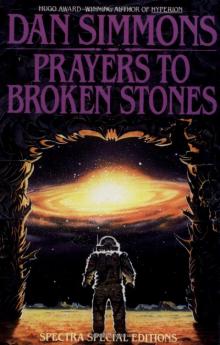 Remembering Siri
Remembering Siri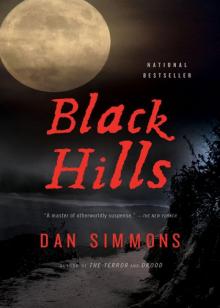 Black Hills: A Novel
Black Hills: A Novel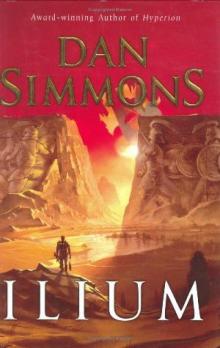 Ilium t-1
Ilium t-1 Hardcase jk-1
Hardcase jk-1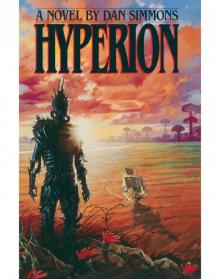 Hyperion 01 - Hyperion
Hyperion 01 - Hyperion